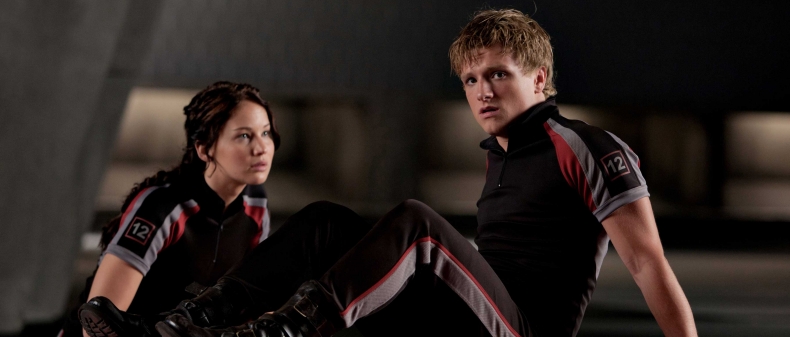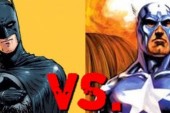
The Hunger Games isn’t a great movie, but it’s much better than a made-to-order Hollywood tent-pole has any right to be. The director, Gary Ross (Pleasantville, Seabiscuit), doesn’t bring much in the way of style, and the sets, costumes, and special effects all border on the chintzy, but the basic B-movie material — teenagers forced to hunt and kill other teenagers in a barbaric future-world game — is gripping and handled with a surprising amount of intelligence. Moreover, the movie doesn’t feel at all like an “event” picture, and I mean that in the most complimentary way. Watching it, you don’t sense anxious studio execs desperately throwing money at the screen. Despite the $85-million budget and god knows how many more advertising dollars, it feels as if actual storytellers are in charge, not the marketing guys. In the current moviemaking climate, that’s a miniature miracle.
You may be aware of this already, but The Hunger Games has a wee bit of a following. It’s based on Suzanne Collins’ enormously popular 2008 YA novel (the first in a trilogy) about a dystopian future in which North America has been ravaged by some unspecified civil war, then divided into twelve districts and a Capitol. In order to keep the populace in line, the Capitol has invented the Hunger Games, an annual televised event in which two teenagers from each district are selected by lottery and made to stalk and kill one another until only one remains. (A lot of internet trolls have been grousing that The Hunger Games is a rip-off of the 2000 Japanese film Battle Royale. Dear trolls — please see: “The Most Dangerous Game,” The Lord of the Flies, Shirley Jackson’s “The Lottery,” The Running Man, Series 7, and the last 24 seasons of Survivor.)
As always when Hollywood takes on an enormously popular novel, there’s been huge pressure from fans that the movie be “faithful.” (That’s the problem with fans: always concerned that adaptations be faithful, not so concerned that they be good.) The movie is faithful, but not to the exhausting extent of, say, the Harry Potter franchise, which, in omitting nothing, gave short shrift to practically everything. Though Collins’ novel is ultra-streamlined already (it zips along as if it could barely wait to be a screen treatment), the screenwriting team of Ross, Collins, and the talented Billy Ray (Shattered Glass, Breach) prune it back even further, sharpening the characters and bringing the themes more clearly into focus. At the risk of honking off Collins’ legions of admirers, I’d say the movie is a decided improvement.
In the book, 16-year-old protagonist Katniss Everdeen — who nobly volunteers for the games to prevent her little sister from having to participate — is a bit too much the idealized modern heroine. When we first meet her, she’s a self-possessed tomboy loner who’s strong, smart, brave, and cares not a sou about romantic love, only about providing for her sister and mother. Yet when she’s shipped off to the Capitol for the games, she cleans up beautifully, charms the pants off everyone, and gets boys falling head over heels for her in spite of herself. She’s a have-your-cake-and-eat-it character, providing both “girl power” and princess fantasy. Worse, Katniss narrates the book, and her constant “who me?” sense of disbelief at the adoration she elicits becomes grating, like a thin girl bemoaning how fat she is.
In the movie, Katniss (Jennifer Lawrence) is still brave and smart and pretty and everything else, but we don’t get the interior monologues in which she protests otherwise. Plus, her many fine qualities aren’t enumerated upfront in bold-faced type. When the film begins, she’s still in the process of discovering who she is, which just feels more truthful. There’s an increasing tendency these days to make teen protagonists — particularly female ones — preternaturally solid and sure of themselves, as if this were a more accurate reflection of the “Millennial” generation and not just an overawed projection on the part of adult writers. But isn’t it more likely that, due to the shallow “self-empowerment” conferred by the internet, today’s teens only seem more sure of themselves? (From what I can tell, the only truly confident kids these days are, as ever, the supremely stupid ones.) In any case, in making Katniss less clearly formidable, the movie makes her more human.
We first meet Katniss in her homeland, District 12, once known as Appalachia. The inhabitants are poor coal miners who, for some reason, still dress like it’s the 1940s. In these early scenes, Ross seems to want to evoke Barbara Koppel’s Harlan County, U.S. A. or the photographs of Shelby Lee Adams, but cinematographer Tom Stern’s shots are so pointlessly caffeine-jittery that nothing is allowed to register. There aren’t even establishing shots — just wobbly close-ups of faces and hands and feet. I guess this is supposed to be “you-are-there” documentary realism, but it just plays as if the camera operator had Parkinson’s, and it prevents the actors from being able to use their whole bodies in their performances. Weirdly, this uber-modern mannerism lessens once we get to the uber-modern Capitol. (Maybe the districts don’t permit tripods?)
Following the lottery, Katniss and her fellow District 12 “tribute,” an unassuming boy named Peeta (Josh Hutcherson), take a train to the Capitol and come face to face with the decadent, vaguely pansexual citizenry. (I debated being offended by the conservative implications here, but decided it wasn’t worth it. You can’t fight Sodom & Gomorrah.) Among those citizens are Katniss and Peeta’s supervisor, the prissy Effie Trinket (Elizabeth Banks), their mentor, the drunken Haymitch (Woody Harrelson), their stylist, the empathetic Cinna (Lenny Kravitz), and the Hunger Games TV host, the unctuous Caesar Flickerman (Stanley Tucci). With their metallic eye make-up, bouffant wigs, and overblown Emerald City fashions, these people give every indication of being cartoon villains, but one of the surprises of the movie is how more or less humane they prove to be, even Effie. They aren’t bad people, per se, they just allow their affluence to blind them to what they’re doing, or they see clearly but can’t imagine how things could ever be different.
The parallels to the current world economic situation couldn’t be clearer, but they’re also nothing new; they’re the stock-in-trade of all dystopian fictions. The more compelling and topical fillip here — and it’s stronger in the film than in the book — is the psychosocial angle. Despite their terror of the games, Katniss and Peeta (as well as the 22 other tributes) quickly discover that the lead-up — days of relentless pageantry, talk-show interviews, tabloid coverage, etc. — is every bit as dehumanizing as the games themselves. The whole first half of the film is about the awfulness of being forced into false positions and phoniness. When Katniss gets dolled up against her wishes, she can’t help smiling at how different she looks, but when she’s expected to act the part of America’s sweetheart, the role chafes. Worse, Peeta uses a TV interview to publicly declare his love for Katniss, but she has no way of knowing if he’s sincere or simply trawling for the audience’s sympathy. As in our own media-mediated world, being real isn’t just increasingly difficult in the Capitol, it’s a liability.
In the film’s second half, the thematic underpinnings abruptly take a backseat to the action of the games. Fortunately, the games prove fairly compelling, not because of any great action filmmaking, but because the filmmakers largely eschew action to emphasize strategy and the moral perils the contestants face. The first few seconds of the games, in which the tributes must choose between running for the woods or battling it out for a cache of weapons and survival supplies, are kind of shocking in their Darwinian awfulness. The strongest kids immediately pick off the weakest in a cruel bloodbath, and before we know it the competition has been reduced by half. Ross doesn’t coat the screen in gore here. There’s blood, but it registers almost subliminally, filtered through Katniss’s terrified efforts to escape. Predictably, the movie is now facing the meta criticism that it’s killing children for our entertainment, but scenes like this — played for horror, not kicky fun — are us un-callous as one can reasonably expect from mainstream entertainment.
As the game progresses, Ross has trouble keeping the momentum up. As in the book, there’s an abrupt, arbitrary rule change mid-game that undermines a great deal of the central tension, and the final confrontations are strangely lacklustre, as if Ross had simply run out of steam. But through it all we remain compelled, largely because of Lawrence’s beautifully felt performance.
Lawrence got her big break playing a strikingly similar character in the 2010 indie hit Winter’s Bone, and she’s easily the best reason to see The Hunger Games. Somehow, she sidesteps all the media hype surrounding her casting and creates a real flesh-and-blood human out of a largely reactive role. Her green, almost unblinking eyes are fabulous instruments here — we seem able to read all of her emotions through them. Ultimately, the drama of the movie isn’t even on the battlefield, it’s in those eyes. We spend the first half of the film registering the guarded humanity in them, then we watch, anxiously, as she tries to keep that humanity intact.
_____
Scott MacDonald writes about cinema for Toronto Standard.
For more, follow us on Twitter: @TorontoStandard and subscribe to our Newsletter.














